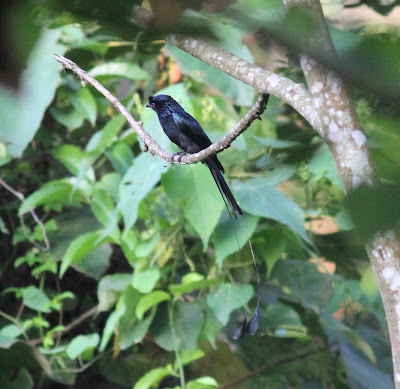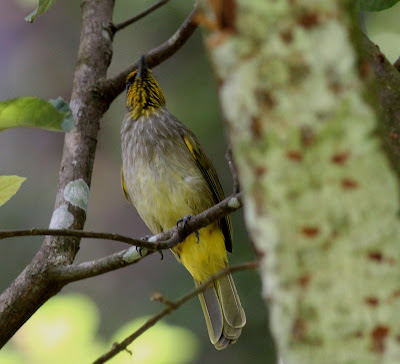Frim, Kepong is a well managed forestry area with a variety of nice looking birds to see . It is located not too far away from KL city and has a pond area which is frequently visited by star birds. I was already at the pond area by 7.30am. Making my way there i stumbled and startled a snoozing wild boar - yup it was fat and whithish grey in colour.
A Blue-Winged Leafbird (Male) - the first bird seen.
This is a Crow-Billed Drongo and not an ashy drongo as verified by Yang Chong. Here is what he has to say: "a 1st winter Crow-billed Drongo because of heavy bill, up-turned tail tips and spotting on underparts and of course habitat. Ashy Drongo prefers somewhat more open country and secondary brush, usually away from forest: mangroves, mangrove edge, plantations and village gardens are prefered habitats. Incidentally, the Crow-billed is a migrant and will not be found after May, returning only in Aug/Sept. Only first winter birds show the white spotting, the older birds are all black so you would need to look for the forked up-turned tail tips and the heavier, crow-like shaped billed. Juvs. of Black Drongos etc.. will all have white spotting on the vents and sometimes breasts"
Hawking for insects nearby was this Greater Racket-Tailed Drongo.
Finally i managed to get a photo of this illusive resident of the pond area - a White Breasted Waterhen.
A Large-Billed Crow? was seen flying across shortly.
(note: after further review and having spoken to some experts, this crow looks more like a Slender-Billed Crow)
Followed by these two "twins" - same flight pattern as well as bleached wing shoulders.
I sneaked up below this White Throated Kingfisher after it called.
Than this Blue-Eared Kingfisher appeared out of no where.
This is a flycatcher alright but not sure which type it belongs to?
These are juveniles Banded Bay Cuckoo. Saw two of them.
This must be one of its parents.
This is a Common Iora. After seeing this bird i left the pond site and went into the jungle trails.
Saw at least 3 of this Crested Serpent Eagle.
This is a resident Giant Black Squirrel doing some acrobatic maneuvers between the twigs to get to a ripe fig. The last time i saw him was with the SBBG bird outing a few years back. So it looks like he is doing well here.
The first bird i saw in the jungle trail was this Grey-Bellied Bulbul.
The next was these Stripped-Throated Bulbuls.
This is a Javan Myna perched on top of a roof.
I also saw a Red-Eyed Bulbul.
This is a Brown Barbet which came down to eye level.
In one of David Wells book, it was said that if its bill is redish pink, it means that it is either a female or a juvenile. So could this bird be a juvenile/female as its bill is slightly brownish?
Saw this Pin-stripped Tit Babbler trying to rip apart a stick insect.
This is a Dark-Necked Tailor Bird.
On the way back i stopped by at the pond area again hoping to see whether i miss out any birds. Nope i only saw this Common Tailor bird.
...and this common tortoise basking in the hot sun.
Overall this place was not too bad for a half-day birding trip.




































































